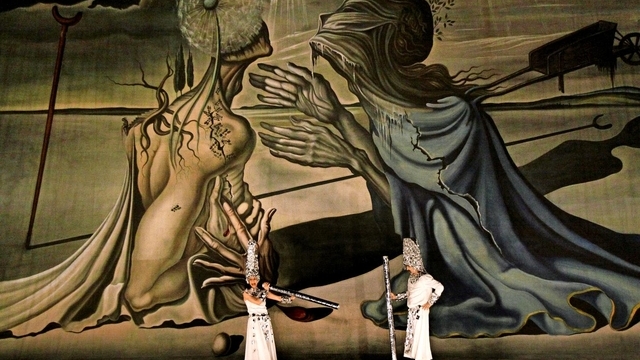★★☆☆☆ Compania Finzi Pasca’s response to Dalí’s surrealist vision needs to take a few things off.
The State Theatre, Arts Centre Melbourne
January 21, 2016
The circus isn’t what it used to be, and for the most part, that’s a wonderful thing. Artists like French mime-pioneer Philippe Decouflé, grandson of Charlie Chaplin James Thiérrée, and, of course, the international juggernaut of modern circus-theatre, Cirque du Soleil, have elevated this quirksome entertainment genre to a finely honed and respected art form. These sophisticated shows are as far away from the provincial, traveling big-top of yesteryear as a country barn dance is from Swan Lake.
But it takes a great deal of precisely judged theatrical acumen to transform a circus curio into a bonafide artwork, and Compagnia Finzi Pasca’s La Veritá, which arrived in Melbourne this week after a short season at the Sydney Festival, is still lingering somewhere in between these two paradigms.
This show’s inspiration is high-brow enough, drawing on the symbolism and iconography of a recently rediscovered scrim – a theatrical backdrop – created by the indomitable Spanish surrealist, Salvador Dalí. Painted in 1944, it conjured a strange and startling world for the obscure ballet, Tristan Fou (Mad Tristan), staged at New York’s Metropolitan Opera House. Locked in a box and forgotten until recently, this incredible and gargantuan painting (measuring 9 x 15 meters) depicts a nightmarish vision of the doomed medieval lovers, Cornish knight Tristan and Irish princess Iseult. Director Daniele Finzi Pasca has sought to give this colossal Dalí one more moment in the spotlight, but his interpretation of this powerful and bleak vista is flippant at best.
 Salvador Dalí’s Tristan Fou
Salvador Dalí’s Tristan Fou
Visually, La Veritá is an admirable spectacle. With a solid core of traditional circus, including acrobats, jugglers, aerialists, contortionists and far, far too many clowns, there are passing references to Dalí throughout. These include giant dandelions, poles and crutches, giant eggs and even quite a few Dalí masks to make sure the connection to the artist is really conspicuous. However, there’s very little dramatic finesse or narrative integrity to bind this show together.
Dramatically, the atmosphere is light as a feather and primarily comedic, although the gags are often quite predictable. There’s nothing wrong with this per se, but it seems to go against the grain of Dalí’s grotesque, sexually provocative source material. Composer Maria Bonzanigo gets closest to tapping into Dalí’s aesthetic, but the sombre lyricism and deranged polkas of her score only act to highlight how out of sync the action is to its inspiration.
Each display of circus daring is interspaced with a short vignette to allow time for scene changes, but these largely limit themselves to whimsical goofing around. This might not be too problematic, as the various death-defying turns themselves are genuinely captivating. However, Finzi Pasca incessantly populates this bizarre universe with the same lolloping, clumsy clowning-about. The effect is a distracting and downright irritating cavalcade of fairly low-rent slapstick that only acts to draw focus from the spectacle above.
There are some moments of pure poetry that really hit their mark, such as one darkly elegant scene where two Rhino-headed men play a piano while a faintly lit acrobat twists and curls through an astonishing display that brazenly taunts gravity. However, for the most part, there is far too much silliness to steal focus from the fantastical beauty that this show could have. Perhaps I’m being a bit of a curmudgeon, but any one of the stunning ariel acts could easily command the entire stage in glorious isolation, without the need for all the extra buffoonery.
In addition to Dalí’s scrim, the 1944 premiere of Tristan Fou also featured costumes designed by Coco Chanel, and an infamous maxim of hers, about the elegant chic of simplicity, seems to be particularly appropriate. “Once you’ve dressed, and before you leave the house, look in the mirror and take at least one thing off,” she advised. It’s a sentiment that could easily apply to this production.
Arts Centre Melbourne presents Compagnia Finzi Pasca’s La Veritá, until January 23.











Comments
Log in to join the conversation.